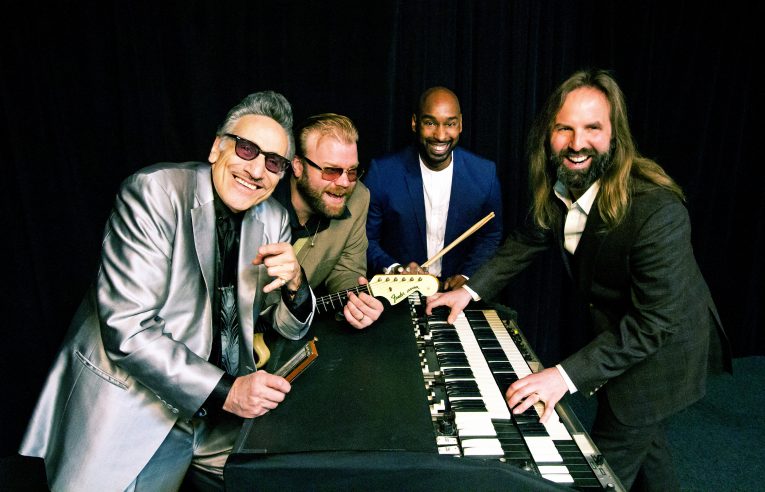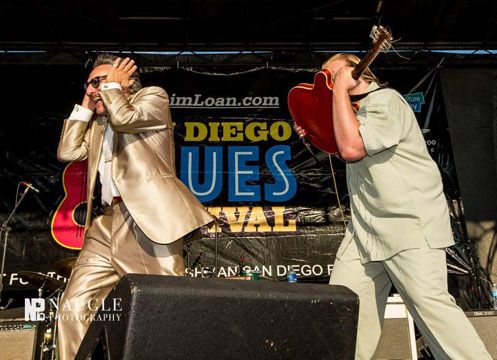
Rick Estrin & The Nightcats photo: Rachel Kumar
By Kevin Porter
It’s not often that a band combines virtuoso musicianship and humor, but Rick Estrin & The Nightcats is one such band. Estrin is considered one of the best harmonica players and songwriters in the blues industry, and he won Blues Music Awards in 2018 Traditional Male Artist of the Year and Song of the Year for “The Blues Ain’t Going Nowhere” off of Groovin’ in Greaseland in 2017. Estrin’s lyrics in songs such as “I Met Her On a Blues Cruise” and “Contemporary,” are guaranteed to bring a smile to your face.
Rick Estrin & The Nightcats, featuring guitarist and prolific music producer Kid Andersen, keyboardist Lorenzo Farrell and drummer Derrick “D’Mar” Martin, are considered one of the best in the business and were winners of the Blues Music Award for Best Band of the Year in 2018. Estrin was the front man for Little Charlie & The Nightcats for 30 years until Little Charlie retired in 2008, after which Estrin took over. Rick Estrin & The Nightcats are back with a hot new album, Contemporary, out on Alligator Records, that will likely win them more awards. Estrin was kind enough to talk to us by phone.
Kevin Porter: Thanks for taking the time. I want to congratulate you on the new record, Contemporary. What were you trying to accomplish with this record and how is it different from Groovin’ in Greaseland?
Rick Estrin: I think there’s some different feels – there’s some more modern – I hesitate to use the word modern with the title track because it’s satire, you know. Some of the other songs have more like a late 1960s or early 1970s kind of groove. But actually, what happens is the songs themselves dictate the kind of treatment they get. It’s not really a conscious decision to “let’s make a record that’s more like this or more like that.” It’s just whatever the songs dictate.
Kevin Porter: How did the title song come about? By the way, I thought it was hilarious.
Rick Estrin: I was just looking at how people try and chase the next big thing and the different routes to popularity. I understand that everybody wants to do better than whatever, but sometimes it’s kind of comical watching guys. I’ve never been able to be anything but me; so, maybe if I had more talent, I could do a tribute to Tom Jones album. (Laughter.)
RE: (Laughter.) It’s just my little bit of fun, poking at the music business.
KP: You mean like the farewell tour that morphs into the welcome back tour?
RE: Yeah, yeah. All that and people reinventing themselves and once that’s played out, they get back to their roots. And that’s news. You’re in the business of observing this stuff, so you see it. I love music, and it’s a beautiful thing, and its existence is a real gift to the whole world. But the music business is another example of how bullshit rules the world. Whatever people think you are, that’s what you are.

Photo: Rachel Kumar
KP: Tell me about the video. I particularly enjoyed the sort of “silent film” era material at the very beginning. How’d you guys come up with that?
RE: We knew we had to make a video and it’s a perfect song for a video. Kid really had a vision for how the whole thing was going to go. It was his idea to have the silent movie in the beginning in black and white and all that. It was just perfect.
KP: I was actually just as impressed that you guys found a pay phone. (Laughter)
RE: (Laughter) That was all serendipity. We were in Plattsburgh, New York. This woman that was taking pictures of us, her neighbor happened to have a dial phone – the dial phone I’m using in the video. In the club we were playing, there was a vestibule to the women’s restroom, and when the doors swung open, Kid saw the pay phone in there. We just made sure the restroom was empty – we had someone stand guard outside – and filmed that little part in the women’s restroom of this club.
KP: Anything for art, right?
RE: Oh, yeah! We made that whole video in about two or three days while we were on the road gigging. We shot part of it in Plattsburgh, New York, and part of it in Trois-Rivières in Quebec, Canada. We went into a Burlington Coat Factory, and I put on a suit that was a couple sizes too small. We went into a costume shop, and I put on the beard and you know, goofed off. It was fun, and we were laughing the whole time.
KP: Let me go to another song on the album that I liked a lot, “Resentment File.” I particularly liked this line, “She’s playing chess while you guys are still learning checkers.” Tell me about that song.
RE: That’s a co-write with my friends Joe Louis Walker and Jojo Russo. Jojo writes songs with Joe Louis Walker a lot, and he’s written songs with Elvin Bishop. Anyway, Jojo was at my house, and he was helping me clean up an old 1956 Cadillac that I wanted to sell. I was showing him some of the stuff that I had for this record, and he was showing me a couple of little snatches of things. He had these lyrics, “Resentment File, now you went and did it. Resentment File, she ain’t never gonna forget it.” He told me that he had written that off of something that Joe Louis had said. JoJo was in a fight with his girlfriend and Joe Louis was there, and JoJo cussed her out and Joe Walker says, “You going in the resentment file now.” It happened just like that. As soon as JoJo said that, I thought to myself, I’m writing that one.
KP: We already talked a little bit about your band, but tell me more because they are amazing, and you guys have been nominated for numerous awards.
RE: It’s the best band in the world. I feel sorry for anybody who has to follow us. Well, we’ve got Lorenzo Farrell, who is an incredible organ player and he also covers the bass with his left hand. Kid Andersen, you know, he’s a genius, he’s always up for Guitarist of the Year. And then Derrick D’Mar, you saw him rapping. He is like the 8th wonder of the world. If you ever come see us, watch him do a drum solo – it’s the most entertaining thing you have ever seen. He’s just a great addition in every way because he’s a great player and brings so much positivity and energy that it lifts everybody else up.
KP: We talked a little bit about writing songs, but how do you write songs?

RE: It can start a few different ways. Generally, it starts with “We really need a new record.” (Laughter.) But, seriously, sometimes, I’ll hear somebody say something or I’ll think of a phrase and the meter of the syllables will suggest the melody and the groove. And then, sometimes, I’ll just sit down with the guitar and start messing around and come up with something. Once I have an idea for a theme, though, you got to be tenacious if you want it to be good. It takes a lot of editing to make something sound like it’s just flowing easily and conversational. Sometimes that takes a lot of tweaking and re-working and just breaking it down and getting it to its most direct and strongest base. There’s a lot of considerations.
KP: What drew you to playing the harmonica?
RE: It was just a decision I made. Two people gave me harmonicas – my mother gave me one, because I asked her for it, and I was in the hospital at the time. Shortly after that, there was a band down the street from our house, like an imitation British invasion-kind of band. They would rehearse, and I would go over and smoke weed and listen to them. One day, the guy who was sort of the driving force in that band, gave me a harmonica and said I should learn how to play it. At the time, I was sort of floundering around and had nothing to do. I wasn’t that interested in school. I went into a room by myself, and it seems like I played a couple of hours. I wouldn’t call it playing, but I was breathing through the thing. I decided I’m going to learn how to do this.
KP: You jammed with Muddy Waters, right? What was that like?
RE: It was great. One of the greatest memories that I have was the first time I played with Muddy. I went to Theresa’s on the South Side, they had a blue Monday jam session and that place was packed full of people. I sat in and just tore it up. Carey Bell, who at the time was playing with Muddy, told me he was going to quit the band and to come down to the Sutherland Hotel that weekend, and I could sit in. If Muddy dug me, I could probably have the job. I went down there on Friday night and waited all night until 4 a.m., and he never called me up. I asked Muddy at the end of the night, “I thought you were going to call me up.” He said, “Oh, yeah, I forgot. Come back tomorrow.” He was just trying to see how serious I was. I went back the next day, and he called me up and I played “Long Distance Call.”
When they took a break, Muddy was sitting at a table against the wall with some women, and he beckoned me over with his finger. I went over and he started shaking his finger in my face, and he said, “You out of sight, boy! You got that sound, boy. I know that sound when I hear it. That’s my sound. You play like a man!” I was 20 years old, and I was practically levitating. He gave me his phone number, and I gave him my phone number. This was obviously way before mobile phones. I kept waiting for him to call, and he didn’t call. So, I went back to California and that was that
KP: My understanding is that Muddy did try to reach you, right?
RE: Yeah, and later on, when I saw the band, Muddy said, “What happened to you? You lamed out. You took it on the lam. Man, you were supposed to be with us.” (Laughter) But it didn’t happen. It worked out okay because I got to develop my own act. I worked with Little Charlie a few years later, and I got to develop my own thing.

KP: You were with Little Charlie & The Nightcats for 30 years, weren’t you? Was it a surprise when Little Charlie decided to retire from touring?
RE: It was a huge shock. I didn’t know what the hell I was going to do. The drummer for Little Charlie at the time, J Hansen and Lorenzo, who’s still with me, they wanted to keep it going. I was open to that, but I just didn’t know who we could get to play guitar.
I always said that Little Charlie is one of a kind. He’s a very distinctive guitar player and a great musician. I didn’t want to get just anybody. Kid Andersen was someone that I always knew could do it, but he was playing with Charlie Musselwhite at the time. Kid called me and I told him that Little Charlie had quit. He told me he wasn’t doing anything—I guess he had left Musselwhite. I asked him if he wanted to try to plug in and play together, and he said, “Yeah.” It was almost seamless.
KP: What’s on the horizon for you? I assume you’ll be touring to support the new record.
RE: Yeah, we’ll be touring, and I feel really, really excited because the initial response to this record is a little bit elevated from where it normally is. I’m really looking forward to this next chapter. It’s going to be fun. We’re already having fun. We’ve got some touring still left in this year. This record is doing good. I just feel good, and I’m excited. I feel happy and lucky. I’m going to do this till I can’t do it no more.
KP: Thanks for your time, and good luck with the new album and the tour.
RE: Alright, great, and thank you.
For more information on Rick Estrin:

Leave A Comment